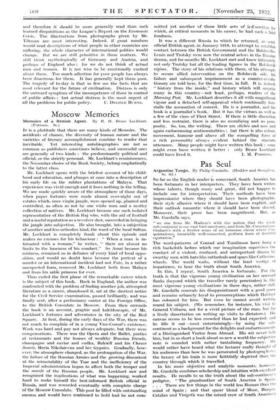Moscow Memories
Jr is a platitude that there are many kinds of Memoirs. The accidents of chance, the diversity of human nature and the varieties of literary accomplisinnent combine to render that inevitable. Yet interesting autobiographies are not so common as publishers sometimes believe, and successful ones are generally of two kinds : the predominantly political and official, or the strictly personal. Mr. Lockhart's reminiscences, the November choice of the Book Society, belong emphatically to the latter class.
Mr. Lockhart opens with the briefest account of his child- hood and education, and plunges at once into a description of his early life on the rubber plantations of Malaya. That experience was vivid enough and it loses nothing in the telling. We are made quickly aware of the atmosphere of those days, when paper fortunes were made almost over-night out of estates which, once virgin jungle, were opened up, planted and controlled, as often as not by one white man and a motley collection of natives. Mr. Lockhart became one such isolated representative of the British Raj who, with the aid of football and a useful reputation as a revolver shot, succeeded in bringing the jungle into subjection. He also brought, into a subjection of another and less orthodox kind, the ward of the local Sultan. Mr. Lockhart is completely frank about this episode and makes no excuses for his behaviour : " When a man is in- fatuated with a woman," he writes, " there are almost no limits to the baseness of his conduct." So Amai became his mistress, remained so in defiance of every kind of local oppo- sition, and would no doubt have become the pretext of a murder or an international incident had not Fate, in a rather unexpected form, removed Mr. Lockhart both from Malaya and from his sable princess for ever.
Thus ended the first phase of the remarkable career which is the subject of this book. Back in England, the author was confronted with the problem of finding another job, attempted literature as a career, abandoned it, sat at the shortest notice for the Civil Service examination, passed brilliantly, and was finally sent, after a preliminary canter at the Foreign Office, to the British Consulate in Moscow. From then onwards the book is an account, graphic and kaleidoscopic, of Mr. Lockhart's fortunes and adventures in the city of the Red Square. At first, during the early days of the War, there was not much to complain of in a young Vice-Consul's existence. Work was hard and pay not always adequate, but there were compensations. There was the Opera and the Ballet, parties at restaurants and the houses of wealthy Russian friends, champagne and caviar and vodka, Baleieff and his Chauve Souris, Maria Nikolaievna and her Gypsies. Gradually, how- ever, the atmosphere changed, as the prolongation of the War, the failure of the Russian Armies and the growing discontent at the intractability of the Tsar and the inefficiency of the Imperial administration began to affect both the temper and • the morale of the Russian people. Mr. Lockhart saw and recognized the implications of what was happening, worked hard to make himself the best-informed British official ia Russia, and was rewarded eventually with complete charge of the Moscow Consulate. This post he filled with outstanding success and would have continued to hold had he not com- mitted yet another of those little acts of iertseretion for which, at critical moments in his career, he had such a fatal fondness.
• It was a different Russia to which he returned, as semi. official British agent, in January 1918, to attempt to establish contact between the British Government and the Bolsheviks. Lenin and Trotsky were now the central actors in the Russian drama, and for months Mr. Lockhart met and knew intimately not only Trotsky but all the leading figures in the Bolshevil, • regime. The story of his relations with them, of his attempts to secure allied intervention on the Bolshevik side, his failure and subsequent imprisonment as a counter-revolu- tionary are told here, for the first time, in full. It is, indeed, "history feam the inside," and history which Will surprise many in this country—not least, perhaps, readers of the Morning Post. Mr. Lockhart describes it all with magnificent vigour and a detached self-appraisal which continually fore- stalls the accusation of conceit. He is a journalist, and his book is a journalist's book. • But it has the virtues as well as a few of the vices of Fleet Street. If there is little discretion and less restraint, there is also no moralizing and no porn. posity. So, too, the writing. There are clichés and now and again embarrassing sentimentalities ; but there is also colour, movement, humour and above all the compelling force of a rich personality always evident behind the staccato utterance. Many people might have written this book ; some might even have written it better : only Bruce Lockhart






































 Previous page
Previous page